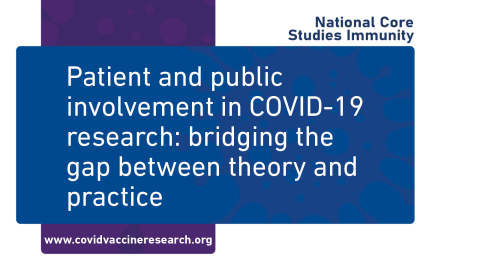
A report exploring the impact of patient and public involvement (PPI) in COVID-19 research has been launched today by National Core Studies Immunity.
The report – Patient and public involvement in COVID-19 research: bridging the gap between theory and practice – has been produced with substantial contribution from a group of patients, carers and members of the public, and describes how research teams working as part of National Core Studies Immunity involved patients and the public in their work.
By presenting the experience of both researchers and public contributors, it offers insight into the challenges overcome, the lessons learned and the positive impact of the involvement on the resulting research.
The report also explores what it means to involve patients and the public in research more generally, and how this can be done well, drawing on perspectives of members of the National Core Studies Immunity PPI panel, which is coordinated by the British Society for Immunology.
The aim of the report is to encourage more research teams to consider involving patients and the public in their work, and to provide practical examples of how this can be done to great effect.
The National Core Studies were set up by the Government Office for Science in the summer of 2020 to ensure that critical questions about COVID-19 – and ways to combat it – could be answered quickly and effectively. Six National Core Studies were set up, including the Immunity programme led by Paul Moss, Professor of Haematology at the University of Birmingham. This was funded by UK Research and Innovation and aimed to deepen our understanding of immunity against the virus, including how to predict individual risk, how to protect against infection, how to use vaccines to our best advantage, and how to prepare for future pandemics.
The report features four National Core Studies Immunity studies in particular:
- The EVITE Immunity study, led by Professor Helen Snooks at Cardiff University, looking at the impact of the shielding policy in Wales.
- BE-DIRECT, led by Professor Manish Pareek at the University of Leicester, exploring whether immune responses differ according to ethnicity.
- The Vaccine Breakthrough Project, led by Professor Aziz Sheikh at Edinburgh University, studying the potential reasons for vaccine failure.
- The VIBRANT study, led by Professor Alex Richter at the University of Birmingham. VIBRANT is part of the wider SIREN study, and is investigating why some healthcare workers fail to mount an immune response after infection or vaccination.
Mo Hafeez, member of the National Core Studies Immunity PPI panel, said:
We have some really good examples of involvement from National Core Studies Immunity – this is the evidence we need to show that it’s working. The aim of this report is to share examples of when involving patients and the public has really worked and had a positive impact, so that others will feel inspired to do it too.
Erika Aquino, Public Engagement Manager at the British Society for Immunology, said:
We wanted to give people some really practical examples of what patient and public involvement can look like when it’s done well. It’s so important to show the huge positive impact involvement can have on the quality of research, and to inspire more researchers to take that first step to involving the public in their own work.
Paul Moss, Professor of Haematology at the University of Birmingham and Principal Investigator for National Core Studies Immunity, said:
So much value can be added to the planning, refining and sharing of research by involving patients and members of the public, and many researchers are becoming more vocal about the need to make this an integral part of research practice. When done well, it can be truly transformational.
Listen to three audio clips recorded by contributors to the report:
Why involve patients and the public in COVID-19 research? - Deb Smith
How can we best involve patients and the public in COVID-19 research? - Lynn Laidlaw
